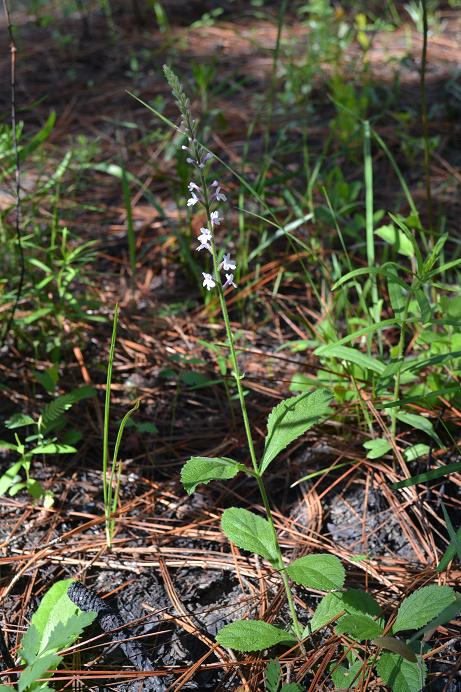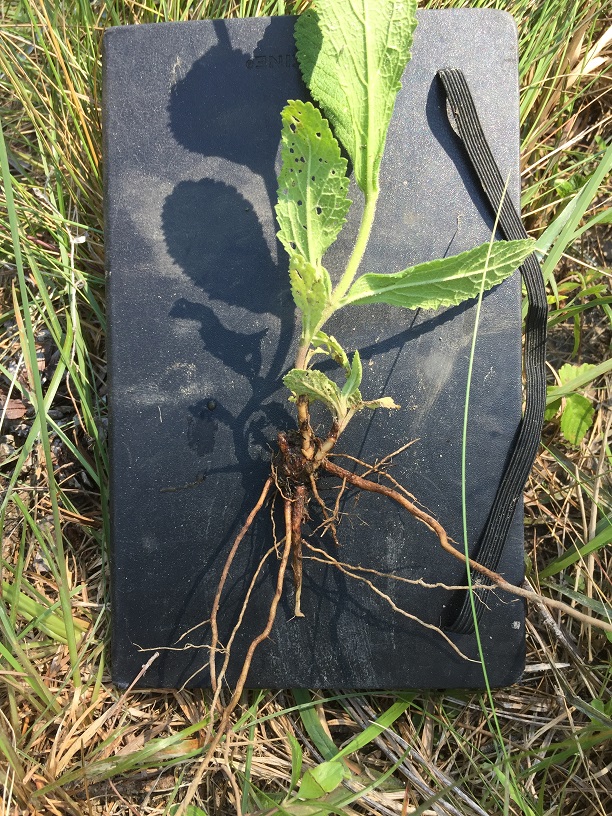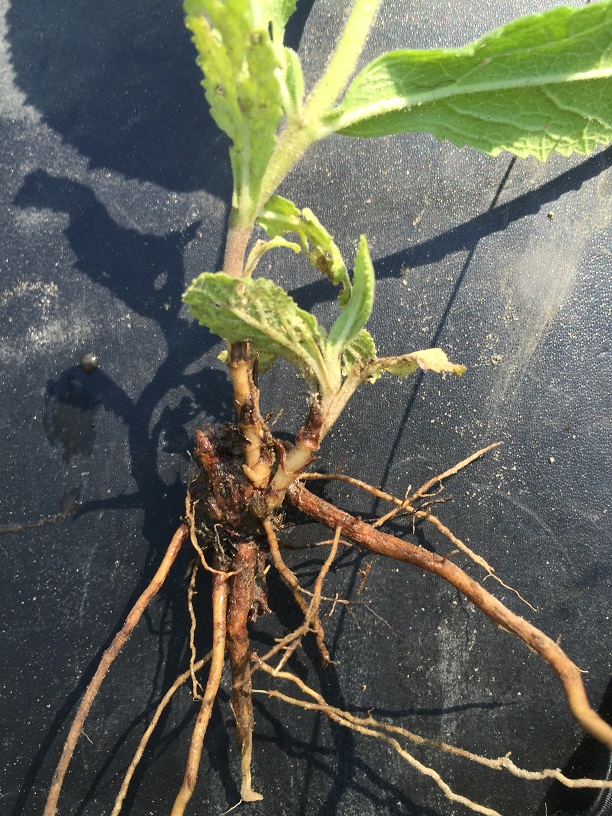Difference between revisions of "Verbena carnea"
(→Taxonomic notes) |
Krobertson (talk | contribs) |
||
| Line 25: | Line 25: | ||
==Description== | ==Description== | ||
<!-- Basic life history facts such as annual/perrenial, monoecious/dioecious, root morphology, seed type, etc. --> | <!-- Basic life history facts such as annual/perrenial, monoecious/dioecious, root morphology, seed type, etc. --> | ||
| − | "Annual or perennial herbs with erect, or ascending to prostrate, quadrangular stems. Leaves simple, opposite. Flowers in terminal, bracteate spikes, the spike usually cymose, paniculate, or solitary. Calyx 5-lobed, lobed united to near apex, the lower usually longer than the upper; corolla salverform, zygomorphic to nearly actinomorphic; stamens included, attached to upper part of corolla tube at 2 levels; stigmas 2, style 1, locules 3. Fruit a schizocarp of 3 mericarps. Mericarps oblong, brown, usually lustrous, and rounded on back, white, grayish or tan, warty or muricate, and flattened on inner surface. Mericarps that separate readily are usually more warty or muricate than those that adhere tightly." | + | "Annual or perennial herbs with erect, or ascending to prostrate, quadrangular stems. Leaves simple, opposite. Flowers in terminal, bracteate spikes, the spike usually cymose, paniculate, or solitary. Calyx 5-lobed, lobed united to near apex, the lower usually longer than the upper; corolla salverform, zygomorphic to nearly actinomorphic; stamens included, attached to upper part of corolla tube at 2 levels; stigmas 2, style 1, locules 3. Fruit a schizocarp of 3 mericarps. Mericarps oblong, brown, usually lustrous, and rounded on back, white, grayish or tan, warty or muricate, and flattened on inner surface. Mericarps that separate readily are usually more warty or muricate than those that adhere tightly." <ref name="Radford et al 1964">Radford, Albert E., Harry E. Ahles, and C. Ritchie Bell. Manual of the Vascular Flora of the Carolinas. 1964, 1968. The University of North Carolina Press. 890. Print.</ref> |
| − | "Erect to ascending perennial, nonstoloniferous, 4-9 dm tall, branched above. Leaves elliptic, oblong or oblanceolate, 4-9 cm long, 1.2-3 cm wide, obtuse to acute, serrate, usually doubly, base attenuate, the uppermost pair of leaves just below the first branches usually pair of basal lobes. Spikes 1-5, terminating the stem, stiffly erect or arching, 1.5-4 dm long, 8-12 mm in diam., flowers imbricate to distant, fruit distant; bracts 1/2 -1X length of calyx. Calyx 3-4.5 mm long, lobes curved inward, not connivent in fruit; corolla pink or pinkish lavender, more than 2X as long as the calyx, lobes 4-6 mm long; bracts, calyx and corolla tube pubescent. Rachis stipitate-glandular. Mericarps all well developed, tightly adhering, appearing as one, 2.8-3 mm long." | + | "Erect to ascending perennial, nonstoloniferous, 4-9 dm tall, branched above. Leaves elliptic, oblong or oblanceolate, 4-9 cm long, 1.2-3 cm wide, obtuse to acute, serrate, usually doubly, base attenuate, the uppermost pair of leaves just below the first branches usually pair of basal lobes. Spikes 1-5, terminating the stem, stiffly erect or arching, 1.5-4 dm long, 8-12 mm in diam., flowers imbricate to distant, fruit distant; bracts 1/2 -1X length of calyx. Calyx 3-4.5 mm long, lobes curved inward, not connivent in fruit; corolla pink or pinkish lavender, more than 2X as long as the calyx, lobes 4-6 mm long; bracts, calyx and corolla tube pubescent. Rachis stipitate-glandular. Mericarps all well developed, tightly adhering, appearing as one, 2.8-3 mm long." <ref name="Radford et al 1964"/> |
==Distribution== | ==Distribution== | ||
==Ecology== | ==Ecology== | ||
===Habitat=== <!--Natural communities, human disturbed habitats, topography, hydrology, soils, light, fire regime requirements for removal of competition, etc.--> | ===Habitat=== <!--Natural communities, human disturbed habitats, topography, hydrology, soils, light, fire regime requirements for removal of competition, etc.--> | ||
| − | In the Coastal Plain in Florida and Georgia, ''V. carnea'' can be found in mixed pine-hardwood stands, burned pinelands, pine-mixed oak-wiregrass communities, and longleaf pine-wiregrass sand ridges | + | In the Coastal Plain in Florida and Georgia, ''V. carnea'' can be found in mixed pine-hardwood stands, burned pinelands, pine-mixed oak-wiregrass communities, and longleaf pine-wiregrass sand ridges. <ref name="FSU Herbarium">Florida State University Robert K. Godfrey Herbarium database. URL: [http://herbarium.bio.fsu.edu http://herbarium.bio.fsu.edu]. Last accessed: July 2015. Collectors: Loran C. Anderson, Rodie White, R. Komarek, R. A. Norris, Robert K. Godfrey, Richard R. Clinebell II, T. MacClendon, - Boothes. States and Counties: Florida: Jackson, Leon, Wakulla. Georgia: Decatur, Grady, Thomas. Compiled by Tall Timbers Research Station and Land Conservancy.</ref> Has been observed to grow in loamy sand. <ref name="FSU Herbarium"/> |
===Phenology=== <!--Timing off flowering, fruiting, seed dispersal, and environmental triggers. Cite PanFlora website if appropriate: http://www.gilnelson.com/PanFlora/ --> | ===Phenology=== <!--Timing off flowering, fruiting, seed dispersal, and environmental triggers. Cite PanFlora website if appropriate: http://www.gilnelson.com/PanFlora/ --> | ||
| − | It has been documented flowering in April and October and fruiting in May | + | It has been documented flowering in April and October and fruiting in May. <ref name="FSU Herbarium"/> |
<!--===Seed dispersal===--> | <!--===Seed dispersal===--> | ||
| Line 55: | Line 55: | ||
==References and notes== | ==References and notes== | ||
| − | |||
| − | |||
| − | |||
Revision as of 10:29, 9 August 2016
| Verbena carnea | |
|---|---|
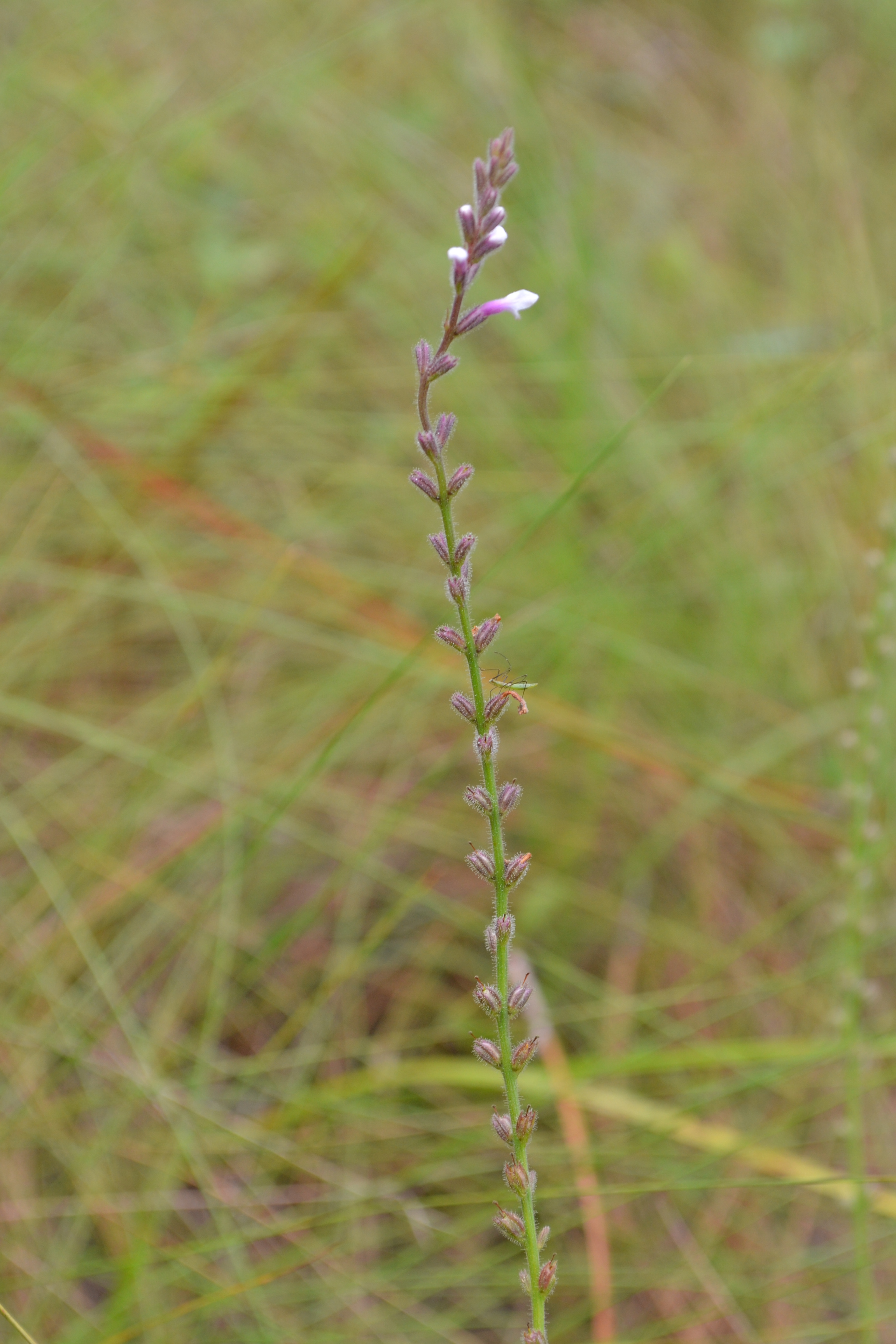
| |
| Photo taken by Kevin Robertson | |
| Scientific classification | |
| Kingdom: | Plantae |
| Division: | Magnoliophyta – Flowering plants |
| Class: | Magnoliopsida – Dicotyledons |
| Order: | Lamiales |
| Family: | Verbenaceae |
| Genus: | Verbena |
| Species: | V. carnea |
| Binomial name | |
| Verbena carnea (Medik.) Moldenke | |
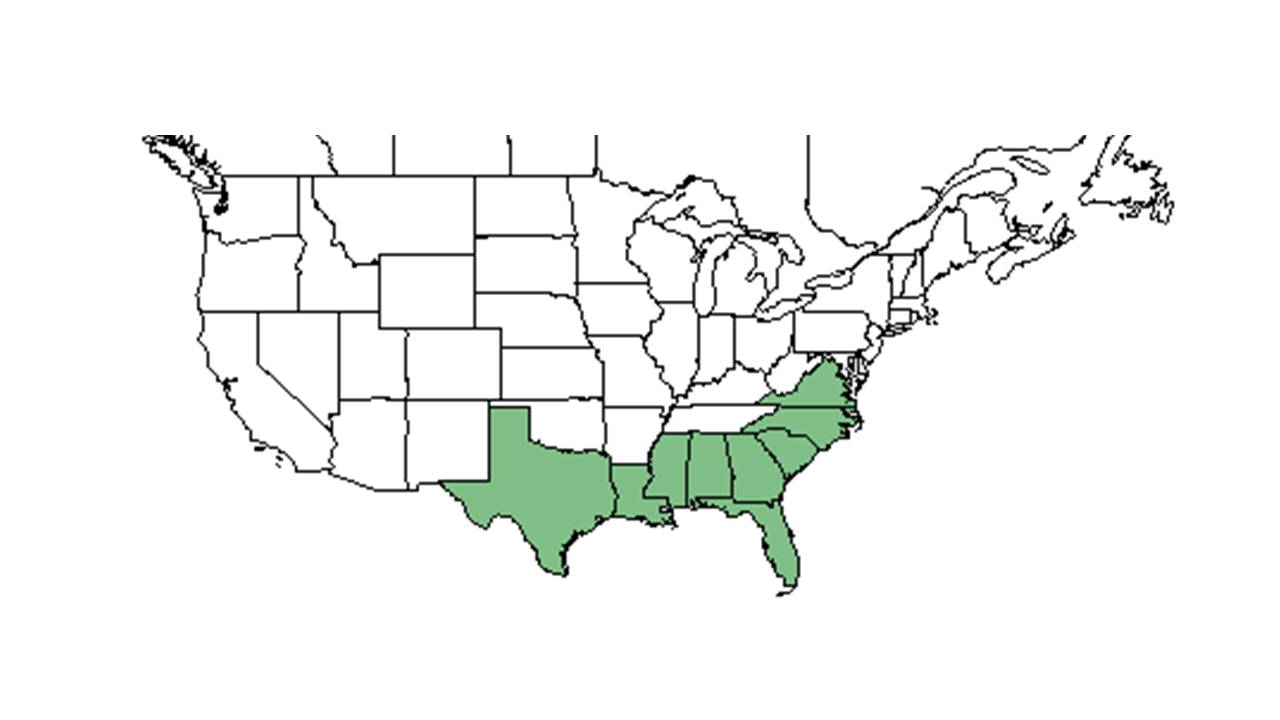
| |
| Natural range of Verbena carnea from USDA NRCS Plants Database. | |
Common name: Carolina false vervain
Contents
Taxonomic notes
Synonyms: Stylodon carneus (Medikus) Moldenke; Stylodon carolinensis (Walter) Small; Verbena caroliniana Michaux
Description
"Annual or perennial herbs with erect, or ascending to prostrate, quadrangular stems. Leaves simple, opposite. Flowers in terminal, bracteate spikes, the spike usually cymose, paniculate, or solitary. Calyx 5-lobed, lobed united to near apex, the lower usually longer than the upper; corolla salverform, zygomorphic to nearly actinomorphic; stamens included, attached to upper part of corolla tube at 2 levels; stigmas 2, style 1, locules 3. Fruit a schizocarp of 3 mericarps. Mericarps oblong, brown, usually lustrous, and rounded on back, white, grayish or tan, warty or muricate, and flattened on inner surface. Mericarps that separate readily are usually more warty or muricate than those that adhere tightly." [1]
"Erect to ascending perennial, nonstoloniferous, 4-9 dm tall, branched above. Leaves elliptic, oblong or oblanceolate, 4-9 cm long, 1.2-3 cm wide, obtuse to acute, serrate, usually doubly, base attenuate, the uppermost pair of leaves just below the first branches usually pair of basal lobes. Spikes 1-5, terminating the stem, stiffly erect or arching, 1.5-4 dm long, 8-12 mm in diam., flowers imbricate to distant, fruit distant; bracts 1/2 -1X length of calyx. Calyx 3-4.5 mm long, lobes curved inward, not connivent in fruit; corolla pink or pinkish lavender, more than 2X as long as the calyx, lobes 4-6 mm long; bracts, calyx and corolla tube pubescent. Rachis stipitate-glandular. Mericarps all well developed, tightly adhering, appearing as one, 2.8-3 mm long." [1]
Distribution
Ecology
Habitat
In the Coastal Plain in Florida and Georgia, V. carnea can be found in mixed pine-hardwood stands, burned pinelands, pine-mixed oak-wiregrass communities, and longleaf pine-wiregrass sand ridges. [2] Has been observed to grow in loamy sand. [2]
Phenology
It has been documented flowering in April and October and fruiting in May. [2]
Fire ecology
It flowers from resprouted vegetation within one month after burning during the growing season.(KMR)[3]
Conservation and management
Cultivation and restoration
Photo Gallery
References and notes
- ↑ 1.0 1.1 Radford, Albert E., Harry E. Ahles, and C. Ritchie Bell. Manual of the Vascular Flora of the Carolinas. 1964, 1968. The University of North Carolina Press. 890. Print.
- ↑ 2.0 2.1 2.2 Florida State University Robert K. Godfrey Herbarium database. URL: http://herbarium.bio.fsu.edu. Last accessed: July 2015. Collectors: Loran C. Anderson, Rodie White, R. Komarek, R. A. Norris, Robert K. Godfrey, Richard R. Clinebell II, T. MacClendon, - Boothes. States and Counties: Florida: Jackson, Leon, Wakulla. Georgia: Decatur, Grady, Thomas. Compiled by Tall Timbers Research Station and Land Conservancy.
- ↑ Observations at Pebble Hill Plantation, Thomasville, GA in upland longleaf pine-wiregrass on Ultisols in or near long-term research plots, 2015.
